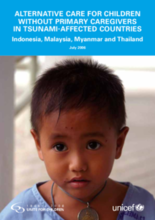On 26 December 2004, a powerful tsunami washed over countries along the rim of the Indian Ocean, resulting in enormous loss of life and leaving in its wake thousands of children suddenly rendered parentless or devoid of familial caregivers. Subsequently, a project to assess appropriate alternative care choices for children without primary caregivers in Malaysia, Myanmar, Indonesia, and Thailand took stock of tsunami-related responses as a basis for identifying sustainable and viable models, good practices and lessons learnt with regard to the impact of the disaster on the lives of children. This assessment examined the basic framework of each country in terms of laws and implementing guidelines for the protection of children; existing alternative care options such as adoption, foster care, kinship care, guardianship, community-based services and their structure; the situation of orphanages and residential centres; and proposed recommendations for sustainable and viable models of alternative care for children.
Overall, the results of this assessment indicate some positive progress and initiatives for children without primary caregivers. The best environment for a child’s optimum development is within their own families. To ensure children remain with their families wherever possible requires major support and priority consideration by governments and other stakeholders. Protection for children in residential facilities must include quality care. All efforts must be made to reunite children with their own families or otherwise to place them in adoption through approved and monitored processes, and to deinstitutionalize the children in a timely and appropriate manner. The commitment and political will of governments, with the support of UNICEF and other partners, are imperative to realize the fulfillment of all the rights of children without primary caregivers, including those in tsunami-affected countries.
This report summarizes the major findings of the assessment and proposes three key recommendations:
- Establish a continuum of child welfare services (supportive, supplemental and substitutive).
- Improve the quality of care for children.
- Strengthen advocacy and the promotion of children’s rights services.
©UNICEF East Asia and Pacific Regional Office

